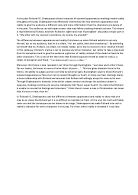Chrisline Thomas October 2009
COURSEWORK: SHAKESPEARE
Discuss the ways in which Shakespeare creates and
maintains dramatic tension in Act III, Scene i of Romeo and Juliet.
Shakespeare’s famous play, “Romeo and Juliet” was written in 1596. In the play, the Montagues and Capulets are bitter enemies. They were two families who had been feuding for several years. The play was written in the time of Queen Elizabeth I, when people were unsure of who would succeed her. England was enjoying wealth and riches and it was one of the most dominant countries at the time. Shakespeare uses the same kind of setting for Verona in “Romeo and Juliet.” Verona is ruled by a Prince, and the main characters are clearly from noble backgrounds. It is also clear who the heir of each family is going to be, and Shakespeare stresses their responsibilities. He makes it obvious how the characters in those times were expected to do everything to defend theirs and their family’s honour. They were expected to fight and kill if necessary. The families of young people also chose who their sons and daughters married and in most cases, the young people had no say in it. The audience in those days expected the play to have lots of sword-fighting scenes, whereas the modern audience see “Romeo and Juliet” more like a romance play.
Shakespeare uses the expectations of the audience to establish tension at the beginning of the scene. The audience know that the Montagues and Capulets are sworn enemies, so they expect some conflict between the young men. Tybalt appears to try his best not to get into a fight. However, he makes indirect, subtle insults to provoke a fight rather than directly confronting the young Montaugues. The audience expect a fight to break out. To a sixteenth century audience, the sword fighting stunts were the highlights of the play. The word-play prepares the audience for outbreaks of violence when Tybalt refers to Romeo as “my man.” This means that Romeo is the person he was looking for. However, Mercutio deliberately takes this in the wrong way, and pretends to believe Tybalt is referring to Romeo as his servant. Mercutio threatens Tybalt by saying that he’d rather be “hanged” than let Romeo be his servant. Mercutio is trying to provoke a fight by taking everything Tybalt says in the wrong way. This word play and exchange of insults make a fight more likely to happen because as well as being sworn enemies, the two characters are expected to defend theirs and their family’s honour by whatever means necessary (even by fighting). The audience are expecting the sword fighting to start, as it is the highlight of the play, but Shakespeare deliberately delays this scene to tease the audience in order to create tension. More insults are exchanged, and the audience can’t predict how much longer the two characters are going to put up with the humiliation. This effect on the audience creates tension as the eagerly-awaited scene of sword fighting is being denied, and the scene is very unpredictable.







